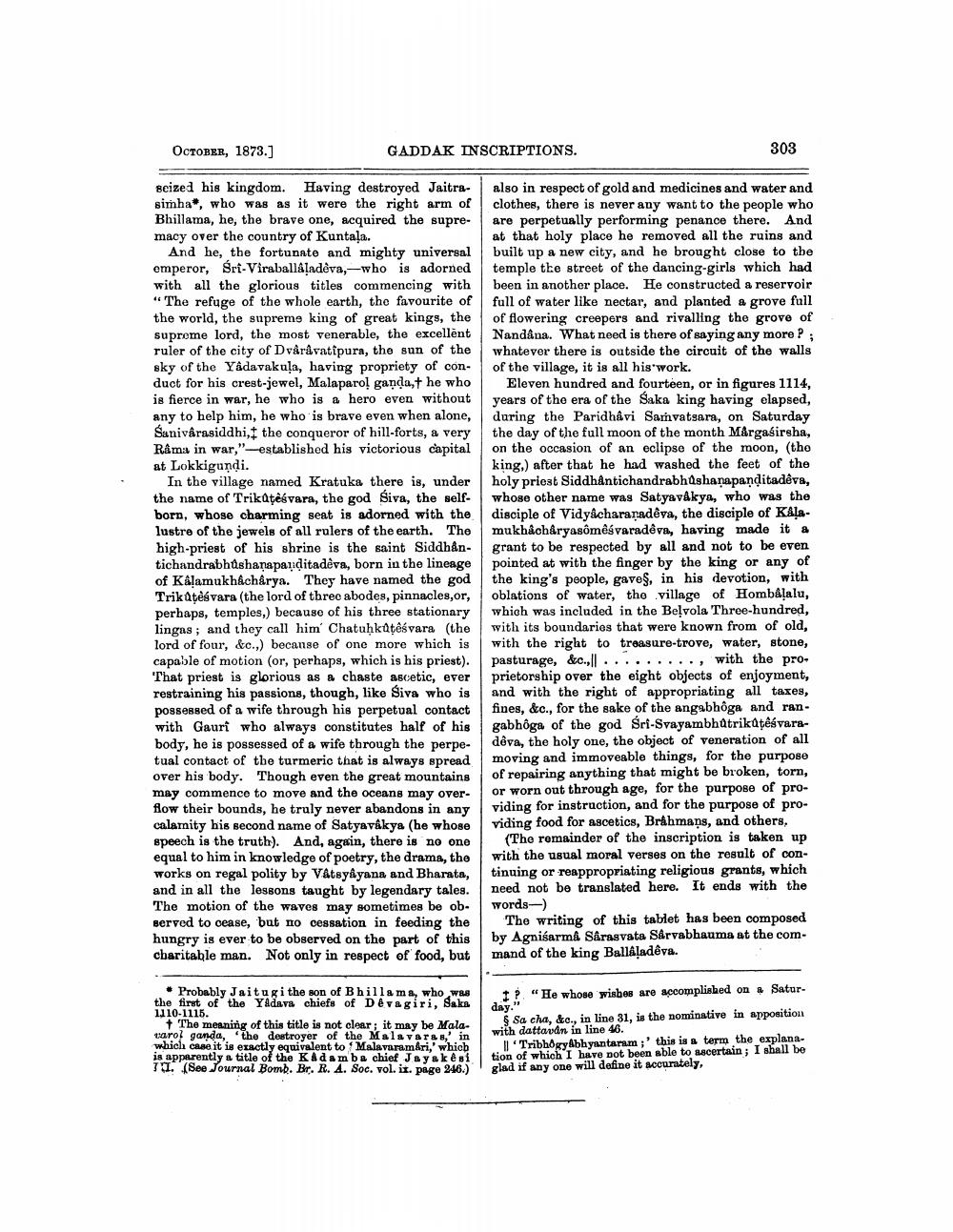________________
OCTOBER, 1873.]
scized his kingdom. Having destroyed Jaitrasimha, who was as it were the right arm of Bhillama, he, the brave one, acquired the supremacy over the country of Kuntala.
GADDAK INSCRIPTIONS.
And he, the fortunate and mighty universal emperor, Sri-Viraballâladeva,-who is adorned with all the glorious titles commencing with "The refuge of the whole earth, the favourite of the world, the supreme king of great kings, the supreme lord, the most venerable, the excellent ruler of the city of Dvârâvatipura, the sun of the sky of the Yadavakula, having propriety of conduct for his crest-jewel, Malaparol ganda,+ he who is fierce in war, he who is a hero even without any to help him, he who is brave even when alone, Sanivârasiddhi, the conqueror of hill-forts, a very Râma in war," established his victorious capital at Lokkigundi.
In the village named Kratuka there is, under the name of Trikütésvara, the god Siva, the selfborn, whose charming seat is adorned with the lustre of the jewels of all rulers of the earth. The high-priest of his shrine is the saint Siddhântichandrabhushanapanditadeva, born in the lineage of Kalamukhâchârya. They have named the god Trikütésvara (the lord of three abodes, pinnacles,or, perhaps, temples,) because of his three stationary lingas; and they call him' Chatuḥkûtêśvara (the lord of four, &c.,) because of one more which is capable of motion (or, perhaps, which is his priest). That priest is glorious as a chaste ascetic, ever restraining his passions, though, like Siva who is possessed of a wife through his perpetual contact with Gauri who always constitutes half of his body, he is possessed of a wife through the perpetual contact of the turmeric that is always spread over his body. Though even the great mountains may commence to move and the oceans may overflow their bounds, he truly never abandons in any calamity his second name of Satyavâkya (he whose speech is the truth). And, again, there is no one equal to him in knowledge of poetry, the drama, the works on regal polity by Vâtsyâyana and Bharata, and in all the lessons taught by legendary tales. The motion of the waves may sometimes be observed to cease, but no cessation in feeding the hungry is ever to be observed on the part of this charitable man. Not only in respect of food, but
Probably Jaitugi the son of Bhillama, who was the first of the Yadava chiefs of Devagiri, Saka
1110-1115.
The meaning of this title is not clear; it may be Malavaro ganda, the destroyer of the Malavaras, in which case it is exactly equivalent to Malavaramári,' which is apparently a title of the Kadamba chief Jayakêsi II. (See Journal Bomb. Br. R. A. Soc. vol. ix. page 246.)
303
also in respect of gold and medicines and water and clothes, there is never any want to the people who are perpetually performing penance there. And at that holy place he removed all the ruins and built up a new city, and he brought close to the temple the street of the dancing-girls which had been in another place. He constructed a reservoir full of water like nectar, and planted a grove full of flowering creepers and rivalling the grove of Nandana. What need is there of saying any more? ; whatever there is outside the circuit of the walls of the village, it is all his work.
Eleven hundred and fourteen, or in figures 1114, years of the era of the Saka king having elapsed, during the Paridhavi Samvatsara, on Saturday the day of the full moon of the month Mårgasirsha, on the occasion of an eclipse of the moon, (the king,) after that he had washed the feet of the holy priest Siddhântichandrabhushanapanditadeva, whose other name was Satyavákya, who was the disciple of Vidyacharanadêva, the disciple of Kalamukhacharyasômêsvaradeva, having made it a grant to be respected by all and not to be even pointed at with the finger by the king or any of the king's people, gave§, in his devotion, with oblations of water, the village of Hombâlalu, which was included in the Belvola Three-hundred, with its boundaries that were known from of old, with the right to treasure-trove, water, stone, pasturage, &c.,... ., with the proprietorship over the eight objects of enjoyment, and with the right of appropriating all taxes, fines, &c., for the sake of the angabhôga and rangabhôga of the god Śri-Svayambhatrikütêsvaradêva, the holy one, the object of veneration of all moving and immoveable things, for the purpose of repairing anything that might be broken, torn, or worn out through age, for the purpose of providing for instruction, and for the purpose of providing food for ascetics, Brahmans, and others,
(The remainder of the inscription is taken up with the usual moral verses on the result of continuing or reappropriating religious grants, which need not be translated here. It ends with the words-)
The writing of this tablet has been composed by Agnisarmâ Sârasvata Sârvabhauma at the command of the king Ballâladêva.
"He whose wishes are accomplished on a Satur
day."
§ Sa cha, &c., in line 31, is the nominative in apposition with dattavan in line 46.
TribhogyAbhyantaram; this is a term the explanation of which I have not been able to ascertain; I shall be glad if any one will define it accurately,




